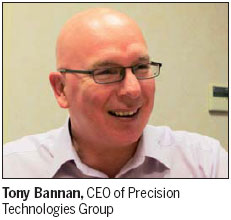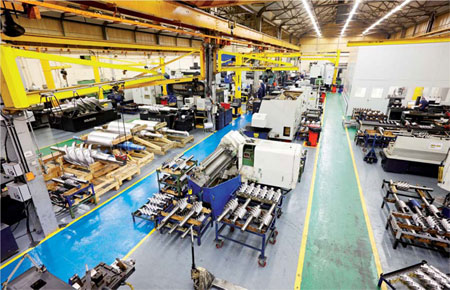Takeover turned into great makeover
Updated: 2013-10-11 09:53
By Cecily Liu (China Daily)
|
|||||||||||
Chinese parent helps British machine tool maker take the high road to success
Tony Bannan still remembers the sinking feeling he had three years ago, when he learnt that his machine tool business was being taken over by a Chinese company.
"It was not exactly a great position to be in. Luckily I was not rigid and was open to persuasion. There were two individuals that particularly had my confidence - the chairman and the executive director, who made me understand the advantages of the deal," says Bannan, the 49-year old chief executive of the Manchester-based Precision Technologies Group.
Three years later, it is a different story. Chongqing Machinery & Electric Co, the Chinese state-owned firm that took control of Precision Technologies in a 20 million pound ($32 million; 24 million euros) deal, has not only breathed new life into the ailing machine tool company, but has also steered it toward a new growth path, focused largely on high technology.
Contrary to fears that the Chinese takeover would lead to job losses, employee numbers at Precision have risen from 157 to 216 in the past three years.
Bannan says most of the research and development work conducted by Precision is on advanced machine tools, something that would not have been possible without support and funding from the Chinese company.
"The thing we admire and respect most about the Chinese parent is that they often take a long term view on the business. For a technology company this is ideal as it brings several new growth opportunities.
"British and American investors often expect returns on their investments after one or two years. However, the Chinese investors often say, do it in three years, but if it takes five we'll still support you."

Having a long-term view does not necessarily mean a more relaxed management style, Bannan says, adding that the parent company has very high expectations with Precision.
Besides developing and producing advanced machine tools at its factory in Manchester, Bannan's team also helps CQME develop new technology through its partnerships with British institutions such as Huddersfield University, Brunel University and City University in London.
Precision has also formed Chong-qing Holroyd Precision Rotor Manufacturing Co, a joint venture in China with CQME's subsidiary Chongqing Machine Tool Group Co, for making compressor rotors for the Chinese market. With investment of more than 8 million pounds, the joint venture now employs more than 25 people.
Precision also regularly accepts employees seconded from the parent company so that there is constant sharing and updating of management techniques and other methodologies within the group.
The partnership is a two-way process and the Chinese parent has gained a lot from Precision's valuable experiences in budgeting, especially its excellent track record in achieving targets within the stipulated budgets, Bannan says.
Looking back at the deal, Bannan says his team's confidence has grown with each passing year. "The links have become stronger. There is a lot of mutual trust and mutual respect between the two sides now.
CQME's acquisition of Precision is not a standalone story. It is also representative of a new wave of Chinese companies acquiring cash-starved high-tech companies in Europe after the debt crisis.
Most of the European companies own advanced niche technologies, but suffer from funding problems. The lack of capital and stiff competition often restrict their growth in global and domestic markets. Fresh injections of capital not only allow these companies to grow locally, but also allow their technology to be used by the Chinese parent company to achieve technology upgrades on a bigger scale in China.
Precision began operations in 1861 as a manufacturing company for machine tools and textile equipment called Holroyd. Over the years, the company has pioneered the design and manufacturing of complex machine tools, having sold more than 2,000 gear, screw and rotor milling and grinding machines around the world.
Its brand has also become synonymous with the concept of absolute precision in the industry, and the group has been recognized three times in the Queen's Award, a highly regarded honor in the UK.
In 2006, the company's ownership was sold to a private equity company. By then, the original Holroyd brand was merged with five other groups including PTG Heavy Industries and PTG Advanced Developments to form Precision Technology Group.
To generate returns on its investment, the private equity company wanted to sell the group to a Chinese buyer as it felt it was the best way to get value for the business, Bannan says.
To achieve this, the private equity firm conducted several road shows in China in 2007 and 2008 and started looking for a Chinese buyer.
"We went to a lot of machine tool companies, and went to some of them several times. In 2009, we narrowed down our choices to three to four potential buyers," Bannan says.
Eventually as some buyers dropped out, the competition narrowed to CQME and a Shanghai company.
Although the Shanghai firm offered a higher price, Bannan felt that CQME would be a better choice as it promised to retain production in the UK, whereas the Shanghai bidder was unclear about its plans.
"If you make highly specialized machine tools with a good brand name, then even Chinese machine tool customers will prefer to buy machines that are built in Europe," Bannan says. "It is a matter of quality expectation and perception of value. Chinese buyers want the best for their businesses. We have learnt that from experience."
Bannan says he was faced with a difficult task, as the private equity owners were more concerned with the return on their investment, and wanted to sell PTG to the highest bidder. At the same time, there were many concerns within Bannan's team about the prospect of a new owner.
"The employees were worried about their own jobs, as they are the type of people that have been here for a long time and wouldn't easily find jobs elsewhere. Many of our employees were industry veterans who were apprehensive about the damage arising from shifting the business to China.
"So there was a large element of 'head' involved, and also a lot of 'heart' involved."
Matters were also compounded after the machine tool industry started languishing due to the global financial crisis. Precision's main lender, Landsbanki of Iceland, suffered a massive blow due to the economic crisis, and many of the company's assets were temporarily frozen. "We were in a very difficult situation at the time, and under considerable pressure," Bannan says.
With pressure coming from all sides, Bannan exercised what influence he could in the company to persuade the private equity owners that the business should be sold to the right buyer. This, he was convinced, would achieve the best value for the business while at the same time ensuring the future success of the company and its employees, for the new owner.
The strategy was successful, and in June 2010, CQME successfully acquired PTG for 20 million pounds, which Bannan says was good value to both buyer and seller.
Since then, PTG has undergone tremendous changes. In the 15 months to June 2010, the company's sales revenue was about 16 million pounds, but it also made huge trading losses in the period, due to the difficult global economic conditions.
Since then, PTG has grown year-on-year. In the 12 months to December 2012, the company generated 25 million pounds of sales income, and more than one million pounds of profit. Bannan says more than 10 percent of the profit is now invested in R&D every year.
The partnership has also won several accolades, prominent among them being the Chinese Investor of the Year Award for CQME at the British Business Awards last year.
However, Bannan says the post-acquisition integration process is not without challenges, and one particularly difficult task was to assure existing customers that the acquisition would not affect the quality of Precision products.
He says this has been challenging particularly in China and the US, two of PTG's top four export markets (besides Germany and India) over the past few years.
"When CQME acquired our firm, some Chinese customers were very nervous. These machines cost a million pounds or higher. So when a Chinese company spends so much money on high technology products they generally prefer to buy a European-built machine."
To maintain the Chinese customers' confidence, Bannan's team went repeatedly to China to assure customers that the machines would continue to be made in the UK.
For the same reason, Bannan's team also made a big effort to retain PTG's customers in the US, particularly those in the US military supply chain who are sensitive on the geography of product and component imports.
"We had to again reassure them that their intellectual property will be safe with us in the UK. We had to give some of them written guarantees. It wobbled for a while, but then settled and is fine now."
Bannan, who was born and brought up in the north of England, an area famous for its manufacturing industries, has seen the changes in Britain's manufacturing industry over the years, including the impact that a Chinese partner can make.
Hoping to share his experiences with other British manufacturing businesses, he made Holroyd one of the founding members of the Manchester-China Forum, a business-led initiative aimed at increasing Greater Manchester's commercial connections with China.
"We want to encourage other North West England manufacturing companies to understand what a Chinese owner can do," he says.
Cecily.liu@chinadaily.com.cn
|
Precision Technologies Group's factory in Milnrow, Greater Manchester. Chongqing Machinery & Electric Co's acquisition of PTG in 2010 has breathed new life into the ailing machine tool maker. Provided to China Daily |
( China Daily European Weekly 10/11/2013 page8)
Today's Top News
Boeing airliner crashes in Russia, 50 killed
Lanzhou takes lead to curb car use
EU, China in right direction
Bringing China's best minds home
Abe busy in ASEAN at Beijing
China police nab 4 drug suspects
President Xi meets Dutch PM
Decisive market tackles overcapacity
Hot Topics
Lunar probe , China growth forecasts, Emission rules get tougher, China seen through 'colored lens', International board,
Editor's Picks

|

|

|

|

|

|






